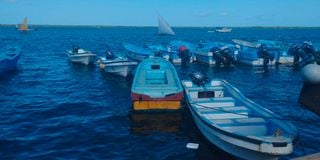Of boat festivals and sundowner concerts in Lamu

Crowds of people thronged the beach, following the boat race, as more arrived from the mainland.
What you need to know:
- Lamu Old Town is listed as one of UNESCO’s world heritage centres. The fort is not only a tourist destination but also a central bearing point for lost visitors.
If you ever make the four or five-hour long journey from Watamu to Lamu mainland by road (and I hope you do), and especially if you happen to be driven by Athumani, a warm, delightful middle-aged man and a generous talker but also a manic driver (in his defense, though, we had a boat festival to catch) there are a lot of things to see – trees, other vehicles on the road and Malindi town whizzing past in an ungodly speed; old Arabic buildings, white walled, modern villas with makuti roof, tin and mud houses and ordinary apartments randomly but peacefully co-existing.
You are also likely to see market centres, sleepy in the midday heat and roadside sellers who hawk all sorts of things, trapped little pockets of the ocean along Malindi-Mambrui road which eventually dry into fields of salt that is then harvested and processed for use, white and pink storks flying territorially around those little pockets of the ocean fishing for small fish, and countless security check-points and military roadblocks
By the time we took a boat from Lamu mainland to the island, the racing boats were well on their way back to the beach. On a normal day in Lamu, activities are a bit slow due to the sweltering heat. However, it was the feast of Maulidi (a religious festival celebrating the birth of the Prophet Mohammed) and the town was bursting with both human and animal excitement.
Crowds of people thronged the beach, following the boat race, as more arrive from the mainland. Young children swum noisily and happily close to the beach while holding onto the ropes for safety. Hundreds of people walked up and down the narrow, squeezed alleys. The main streets are full of sellers displaying their merchandise, restaurants bustling with aromas, donkeys carrying bags, and fat cats lying lazily by the doors, unbothered by the excitement around.
In the evening, we retired to Hijani House where we were being hosted. It is a vintage Swahili house, squeezed in the way houses in Lamu can be, and beautiful in the way they can be, converted to an Airbnb.
Our second day was spent exploring Lamu Old Town which is listed as one of the UNESCO’s world heritage centres. Because of its architectural design and how similar the houses are, it is easy to get lost in Lamu town, which I did. The fort is not only a tourist destination but also a central bearing point for lost visitors.
We spent our last night at Shela beach, attending a sundowner concert by Brian Sigu at Peponi Hotel, which is about 15 minutes and Sh500 on average by boat from Lamu town, or 20 minutes and Sh300 cheaper if you decide to brave the deep sand dunes on a motorbike.
Sunsets at Peponi Restaurant are a spectacular view – the white sand, the rhythmic sound of the ocean slapping against the cement barriers, the deep orange of the sky dipping into the ocean’s dark hue of aquamarine blue in the horizons and the docked boats dancing gently to the nudging of the receding water offer an astounding, almost showboating beauty.
And to watch all this with good food, good company and great music playing in the background is like having all your four wishes fulfilled. Better than if you’d run into a genie.
After Brian Sigu’s phenomenal show, we floundered across the unlit village in the deep sand dunes, most of us already a little unsober, to the village bar for more.
Those open bars where people noisily drink under palm trees and make-shift makuti-roofed structures and where one could get anything from a week-long fermented palm wine (oh, those potent, deceptive drinks!) served in naked, recycled wine bottles, to years-old whisky if you asked.
If you are reading this, even if your friends encourage you to, and especially if they do, restrain yourself from drinking more than one glass of the palm wine if it’s your first time, lest you have an unpleasant date with the washroom the entire day after.




